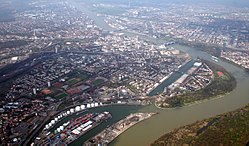This article needs additional citations for verification. (June 2019) |
Ludwigshafen am Rhein | |
|---|---|
 April 2006 aerial view | |
| Coordinates: 49°28′52″N 8°26′07″E / 49.48111°N 8.43528°E | |
| Country | Germany |
| State | Rhineland-Palatinate |
| District | Urban district |
| Subdivisions | 10 districts |
| Government | |
| • Lord mayor (2017–25) | Jutta Steinruck[1] (SPD) |
| Area | |
• Total | 77.68 km2 (29.99 sq mi) |
| Elevation | 96 m (315 ft) |
| Population (2022-12-31)[2] | |
• Total | 174,265 |
| • Density | 2,200/km2 (5,800/sq mi) |
| Time zone | UTC+01:00 (CET) |
| • Summer (DST) | UTC+02:00 (CEST) |
| Postal codes | 67059 - 67071 |
| Dialling codes | 0621, 06237 |
| Vehicle registration | LU |
| Website | www.ludwigshafen.de |
Ludwigshafen, officially Ludwigshafen am Rhein (German pronunciation: [ˈluːtvɪçsˌhaːfn̩ ʔam ˈʁaɪn] ; meaning "Ludwig's Port upon the Rhine"), is a city in the German state of Rhineland-Palatinate, on the river Rhine (Upper Rhine), opposite Mannheim. With Mannheim, Heidelberg, and the surrounding region, it forms the Rhine Neckar Area.
Known primarily as an industrial city, Ludwigshafen is home to BASF, the world's largest chemical producer,[3][4][5] and other companies. Among its cultural facilities are the Staatsphilharmonie Rheinland-Pfalz .
It is the birthplace and death place of the former Chancellor of Germany Helmut Kohl.
In 2012, Ludwigshafen was classified as a global city with 'Sufficiency' status by the Globalization and World Cities Research Network (GaWC).[6]
- ^ Wahl der Oberbürgermeister der kreisfreien Städte, Landeswahlleiter Rheinland-Pfalz, accessed 30 July 2021.
- ^ "Bevölkerungsstand 2022, Kreise, Gemeinden, Verbandsgemeinden" (PDF) (in German). Statistisches Landesamt Rheinland-Pfalz. 2023.
- ^ "BASF Headquarters". BASF. Archived from the original on 2 June 2017. Retrieved 26 February 2016.
- ^ "Who Are The World's Largest Chemical Producing Companies?". World Atlas. Archived from the original on 25 October 2017. Retrieved 25 October 2017.
- ^ "Largest chemical companies worldwide based on revenue in 2017 (in billion U.S. dollars)". Statista. Archived from the original on 25 October 2017. Retrieved 25 October 2017.
- ^ "GaWC - The World According to GaWC 2012". www.lboro.ac.uk. Retrieved 2021-12-24.




